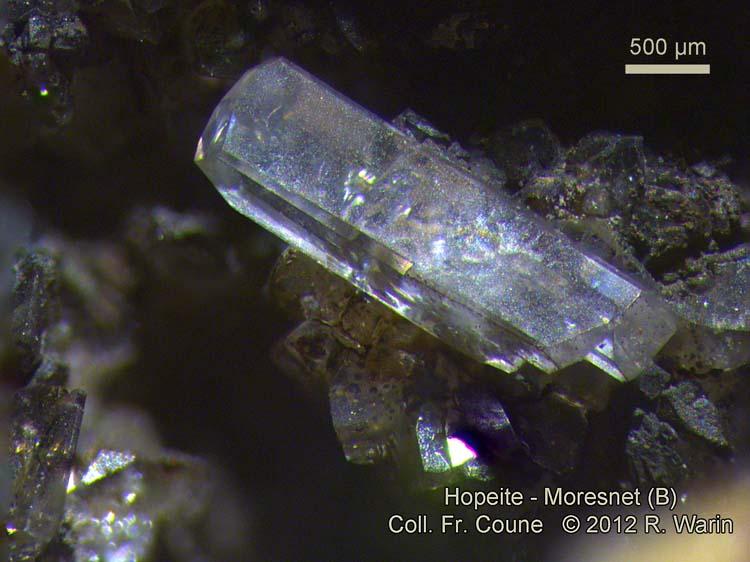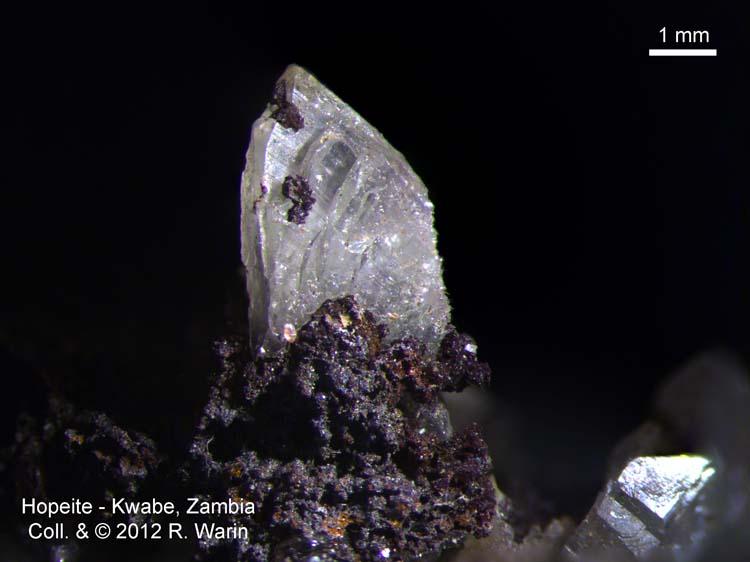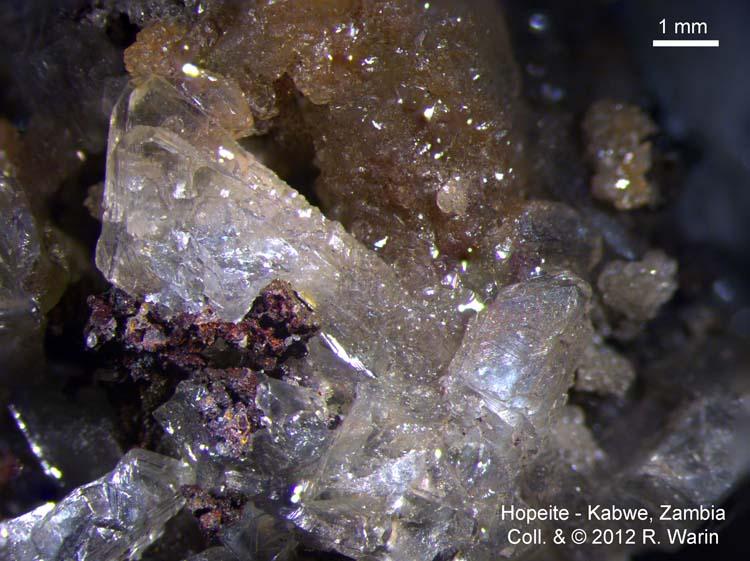| View previous topic :: View next topic |
| Author |
Message |
Mike P.
Joined: 27 Aug 2013
Posts: 15
Location: Toronto,ohio


|
 Posted: Sep 04, 2013 21:38 Post subject: Why an organic substance should not be called a mineral? Posted: Sep 04, 2013 21:38 Post subject: Why an organic substance should not be called a mineral? |
|
|
| A question to ponder: Why is it difficult to see why an organic substance should not be called a mineral if it's chemical nature and its crystalline structure is identical with its inorganic twin.
|
|
| Back to top |
|
 |
gemlover

Joined: 31 Dec 2008
Posts: 211
Location: Easley, SC



|
 Posted: Sep 04, 2013 22:04 Post subject: Re: why an organic substance should not be called a mineral Posted: Sep 04, 2013 22:04 Post subject: Re: why an organic substance should not be called a mineral |
|
|
What organic compound are you considering to have a crystalline structure (not chemical formula, actual crystals)?
John
_________________
John
John Atwell Rasmussen, Ph.D.. AJP
Geologist and Gemologist |
|
| Back to top |
|
 |
Matt_Zukowski
Site Admin
Joined: 10 Apr 2009
Posts: 737
Location: Alaska



|
 Posted: Sep 04, 2013 23:43 Post subject: Re: why an organic substance should not be called a mineral Posted: Sep 04, 2013 23:43 Post subject: Re: why an organic substance should not be called a mineral |
|
|
| The strictest definition of a mineral includes the restriction that it be an inorganic substance. This makes sense because all sorts of organic chemical compounds have a definite chemistry and structure, but we wouldn’t want to call them minerals. Some relax this requirement to say that a mineral can contain “organic” pieces (like the oxalate ion), but that the mineral has to have an inorganic (non-biogenic) origin. Under this looser definition, Whewellite ( a hydrated Ca-oxalate) is a mineral. Note also that there are minerals that have no organic pieces but can have a biogenic origin such as aragonite.
|
|
| Back to top |
|
 |
Riccardo Modanesi
Joined: 07 Nov 2011
Posts: 631
Location: Milano


|
 Posted: Sep 05, 2013 02:52 Post subject: Re: why an organic substance should not be called a mineral Posted: Sep 05, 2013 02:52 Post subject: Re: why an organic substance should not be called a mineral |
|
|
Hi to everybody! Whevellite IS a mineral, because it HAS a definite formula and a definite crystalline structure. Hugo Strunz included shells and bones among minerals in his "Tabellen". In this case I disagree, because a bone is a compound organic substance+apatite, and shells are a compound conchyolin (organic substance)+ aragonite. Some minerals have a biogenic origin, it's true, but they MUST be considered minerals because they HAVE a proper chemical formula and a proper crystalline structure.
Greetings from Italy by Riccardo.
_________________
Hi! I'm a collector of minerals since 1973 and a gemmologist. On Summer I always visit mines and quarries all over Europe looking for minerals! Ok, there is time to tell you much much more! Greetings from Italy by Riccardo. |
|
| Back to top |
|
 |
lluis
Joined: 17 Nov 2006
Posts: 719


|
 Posted: Sep 05, 2013 03:11 Post subject: Re: why an organic substance should not be called a mineral Posted: Sep 05, 2013 03:11 Post subject: Re: why an organic substance should not be called a mineral |
|
|
Ciao, Riccardo, List
All organic compounds have a definite formula. If not, they are just mixtures of organic compounds with anything.
Many, if not all (polymers aparts; long to talk about. They could have crystalline structure. But would be mainly like a glass: a supercooled liquid), have a crystalline structure.
Organic compunds considered minerals, have all organic origin: if not, talking about whewellite, the first crystals were found in a monastery cript, in the rests of bodies of buried monks....
Organic compunds considered minerals, are considered such because they are considered such.... we could dress it in many words. but is a field in which I think to remember that there is not too much consensus...
Loosely, I think that are considered such compunds with a definite composition, not a mixture, found in nature and being old (if not, whewellites from Germany burial, well, ehemmmm...
With best wishes (uhhhh...the chemist in me could not resist to answer....)
Lluís
|
|
| Back to top |
|
 |
lluis
Joined: 17 Nov 2006
Posts: 719


|
 Posted: Sep 05, 2013 04:17 Post subject: Re: Why an organic substance should not be called a mineral? Posted: Sep 05, 2013 04:17 Post subject: Re: Why an organic substance should not be called a mineral? |
|
|
Dear all
About this subject, in chemistry, at least in my UNI, mineral is the opposite to organic.
Mineralization means that in a sample you have destroyed all organic matter, letting the mineral part. Organic, that is produced by a living being.
Then, I suppose that to call an organic substance "mineral", well, it does not change that is an absurdity in language terms... For that exists this mist in this area, I suppose...
When you have a definition and there is something that is among to opposite definitions, well.... How you call it? :-)
With best wishes
Lluís
|
|
| Back to top |
|
 |
gemlover

Joined: 31 Dec 2008
Posts: 211
Location: Easley, SC



|
 Posted: Sep 05, 2013 06:09 Post subject: Re: Why an organic substance should not be called a mineral? Posted: Sep 05, 2013 06:09 Post subject: Re: Why an organic substance should not be called a mineral? |
|
|
Because a chemical compound is produced by an organic animal/plant does not make it an organic compound. Whevellite does not have an organic formula, and it is produced by hydrothermal activity (as well as having been found associated with organic origin).
John
_________________
John
John Atwell Rasmussen, Ph.D.. AJP
Geologist and Gemologist |
|
| Back to top |
|
 |
Roger Warin

Joined: 23 Jan 2013
Posts: 1243



|
 Posted: Sep 05, 2013 08:36 Post subject: Re: Why an organic substance should not be called a mineral? Posted: Sep 05, 2013 08:36 Post subject: Re: Why an organic substance should not be called a mineral? |
|
|
Hi,
Chemistry concerns all atoms. They bind them in very different affinities sometimes. Carbon gives inorganic compounds when combined with elements such as oxygen, sulfur, etc.. But as soon as hydrogen is added, we get a chemistry whose dimensions are infinite, like a galaxy, perhaps.
At this time large varieties of the geometry involved carbon atom to achieve chemical bonding. In addition, the interatomic forces can be very strong or very weak.
Life has understood, since it has chosen the carbon chemistry to exist.
A new branch of organic chemistry is created, it is biochemistry.
But it quickly becomes complex. All chemicals elements can enter into an organic compound. For example, leaded gasoline obviously does not contain metallic lead, because it’s insoluble.
We must hide this metal in an organic derivative (such as a pharmacist pill) to dissolve it in a organic solvent. Lead in the form of tetraethyl lead is soluble in gasoline. They say that lead is included an organometallic compound. This tetraethyl lead is highly toxic because it is compatible (it dissolves) with the fat in our body. It was used as anti-knock agent in gasoline. Given its structure, it can not give crystals, it is a liquid. So, leaded gasoline does obviously not contain metallic lead, insoluble. To dissolve lead in this organic solvent, we must hide lead in an organic derivative (such as a pharmacist pill). Lead in the form of tetraethyl lead is soluble in gasoline. They say that lead is included in an organometallic compound. This tetraethyl lead is highly toxic because it is compatible (it dissolves) with the fat in our body. It was used as anti-knock agent in gasoline. Given its structure and physical porperties, this compound cannot give crystals, it is a liquid.
We can consider the whevellite as an inorganic compound because there is no hydrogen in the molecule.
The living also produces minerals such as whevellite or fluorapatite in the tooth enamel.
These concepts are not simple. A crystal is formed when the component molecules are placed in the right place during the growth of the crystal, through the forces of cohesion of the crystal (of various kinds).
Roger.
|
|
| Back to top |
|
 |
Riccardo Modanesi
Joined: 07 Nov 2011
Posts: 631
Location: Milano


|
 Posted: Sep 05, 2013 09:42 Post subject: Re: Why an organic substance should not be called a mineral? Posted: Sep 05, 2013 09:42 Post subject: Re: Why an organic substance should not be called a mineral? |
|
|
Hi to everybody! And what about carpathite (coronene)? It IS an organic compund, but it is considered a mineral, as reported in the "Glossary" (you should know which book I'm talking about). And there are many other organic compound which should be considered "minerals". On the Italian Mineralogical Magazine of some 20 years ago there is an article about organic minerals.
Greetings from Italy by Riccardo.
_________________
Hi! I'm a collector of minerals since 1973 and a gemmologist. On Summer I always visit mines and quarries all over Europe looking for minerals! Ok, there is time to tell you much much more! Greetings from Italy by Riccardo. |
|
| Back to top |
|
 |
Roger Warin

Joined: 23 Jan 2013
Posts: 1243



|
 Posted: Sep 05, 2013 11:23 Post subject: Re: Why an organic substance should not be called a mineral? Posted: Sep 05, 2013 11:23 Post subject: Re: Why an organic substance should not be called a mineral? |
|
|
Hello Riccardo,
Coronene, or carparthite, is an organic molecule. It belongs to the group of condensed polyaromatic compounds. It has the distinction of being fairly symmetrical. It forms monoclinic crystals.
Crystals are also available in organic chemistry, one evidence, the melting point is a criterion of purity of these molecules.
The nature of the cohesive forces of the crystal differs.
There is no clear boundary between the different parts of a single chemistry. Ultimately, diamond and coal are part of organic chemistry, if we say that it is the chemistry of carbon. In practice, they are placed in the mineral chemistry.
Rocks and fluids such as petroleum? Oil is organic, but its origin is dual. The first oil (that we know) has a biotic origin. But there is also a similar oil included in the upper mantle of the Earth that is abiotic. Its origin is geological and it is not a mineral but an “organic” rock ... I think so.
Everything is a question of words on concepts that overlap.
Finally, carbonaceous meteorites, abiotic of course, are the kingdom of inorganic chemistry. Yet there are also polyunsaturated molecules (such as coronene) in very complex mixtures.
There are also (as we know from the '60s) of amino acids and many other organic molecules.
Life is not necessary to make organic molecules, only molecules that react with each other spontaneously.
Another example. And at what chemistry nanotubes belong? Nanotubes are made of graphene sheets. Graphene is a two-dimensional crystal (monoplane) carbon.
They are at the frontier, and that is why they are so important.
Roger.
|
|
| Back to top |
|
 |
lluis
Joined: 17 Nov 2006
Posts: 719


|
 Posted: Sep 05, 2013 12:35 Post subject: Re: Why an organic substance should not be called a mineral? Posted: Sep 05, 2013 12:35 Post subject: Re: Why an organic substance should not be called a mineral? |
|
|
| gemlover wrote: | Because a chemical compound is produced by an organic animal/plant does not make it an organic compound. Whevellite does not have an organic formula, and it is produced by hydrothermal activity (as well as having been found associated with organic origin).
John |
Dear John
Whewellite *is* an organic compund because it *is* an oxalate.
Oxalates are not formed in inorganic chemistry, you be completely sure.
Oxalates come from diferent routes from organic material.
In case of whewellite upon rests of german monks, it comes from putrefaction of their flesh in determinate circumstances, and calcium from their bones.
Organic compounds were defined, before organic chemistry as the compounds created by life. Oxalic acid is one of them
If you prefer to say that putrefaction is an hydrotermal activity, well, it is, sensu lato, and we are stones doing hydrothermal activities.... :-)
With best wishes
Lluís
|
|
| Back to top |
|
 |
Jordi Fabre
Overall coordinator of the Forum

Joined: 07 Aug 2006
Posts: 5080
Location: Barcelona



|
|
| Back to top |
|
 |
Roger Warin

Joined: 23 Jan 2013
Posts: 1243



|
 Posted: Sep 05, 2013 16:11 Post subject: Re: Why an organic substance should not be called a mineral? Posted: Sep 05, 2013 16:11 Post subject: Re: Why an organic substance should not be called a mineral? |
|
|
Hi,
A good example is back in memory. It will surprise you.
I present hopeite specimens, a zinc phosphate.
One of these specimens is a "mineral" while the other is a "organic" product, and yet they are crystals hopeite.
The type locality is Moresnet (Belgium). It was a major zinc mine of the Belgian company "Vieille Montagne" (actually Umicore).
Here is the photo of a beautiful crystal from the type-locality.
The hopeite from Broken Hill (Kwabe - Zambia) does not lack originality. Indeed, the source of phosphorus is exceptional (missing in Moresnet). This source consisted of many different bones fragmented. These were layered, mixed in various proportions with clays and sands of the central part of the No. 1 Kopje. Various bones have accumulated, filling a large cavern that was not connected with the surface before the start of mining.
The Skull of Homo rhodesiensis has also been found in this cave No. 1 Kopje during mining operations in 1907. The age of the Homo rhodesiensis is currently estimated at 125,000 BC
The hopeite partially replaced the bone fragments from elephants, hyenas, rats and birds. These hopeite crystals were associated with vanadinite crystals.
The relative abundance (on only one site) of the Broken Hill hopeite is contrasting with the exceptional rarity of it in type locality, Moresnet. It is certainly correlated with the biological source of phosphates.
This crystal could thus be considered as an organic compound, since phosphorus is here biotic.
This is not my opinion and I consider hopeite from Broken Hill on a par with the hopeite from Moresnet.
This is the same mineralogical species, with two different geographical origins, but with two different sources of phosphorus.
There is only one chemistry, closely associated with physics.
Roger.
| Description: |
Hopeite
Moresnet, Liege, Belgium
micro
Type locality of this zinc phosphate, a mineral. |
|
| Viewed: |
48325 Time(s) |

|
| Description: |
Hopeite
Kwabe, Zambia - No 1 Kopje
micro
with biotic Phosphorus, an "organic" compound ? No. |
|
| Viewed: |
48391 Time(s) |

|
| Description: |
Hopeite
Kwabe - Zambia - No 1 Kopje Hill.
micro
Chemical elements have no label.
Biotic origine, mineral product. |
|
| Viewed: |
48370 Time(s) |

|
|
|
| Back to top |
|
 |
Mike P.
Joined: 27 Aug 2013
Posts: 15
Location: Toronto,ohio


|
 Posted: Sep 05, 2013 18:17 Post subject: Re: Why an organic substance should not be called a mineral? Posted: Sep 05, 2013 18:17 Post subject: Re: Why an organic substance should not be called a mineral? |
|
|
| From Mike P.: I think we opened a can of worm with this discussion topic. It all goes back to the origins of the universe. Which came first the chicken or the egg or did organic come before inorganic. Thanks all for the great debate. How about Acomes Razor solution.
|
|
| Back to top |
|
 |
lluis
Joined: 17 Nov 2006
Posts: 719


|
 Posted: Sep 06, 2013 01:36 Post subject: Re: Why an organic substance should not be called a mineral? Posted: Sep 06, 2013 01:36 Post subject: Re: Why an organic substance should not be called a mineral? |
|
|
Hi, Roger, Mike, List
Roger, as you say, there only one chemistry (that is inisde physics, although this "tumor" has gone bigger than the "body", as a physics professor in Barcelona UNI said one time in a clas where a friend was, to my pleasure and his distress...).
But, as in minerals, is divided in several parts.
Organic chemistry is one, and has differences with inorganic and with photochemstry.
On the other side, the hopeite is in both cases an inorganic compound.
In the case of Broken Hill hopeite, the source of phosphorus is an mount of old bones.
But it still an inorganic compound, the zinc fosfate.
The whawellite is an organic compound: an oxalate.
Mike, it is not a can of worms.
It is a thema that is not clear because we use to antagonic words: "organic" and "mineral" (inorganic).
Anyway, and what about minerals with ammonia....?
Ammonia in earth uses to have organic origin: the decomposition of proteins, the fermentation of urine and the synthesis by leguminoses (in fact, maybe the only one. The two others, well, ae just recovering what leguminose had done...)
Men do it synthetically.
Ammonia is inorganic. No one calls a mineral with ammonia (e.g., salmiac, as simplest).
But origin of ammonia is mainly of organic origin)
And I have read that dolomite is caused mainly by bacterial activity... Dolomite is never said an organic mineral.....
With best wishes
Lluís
|
|
| Back to top |
|
 |
|




